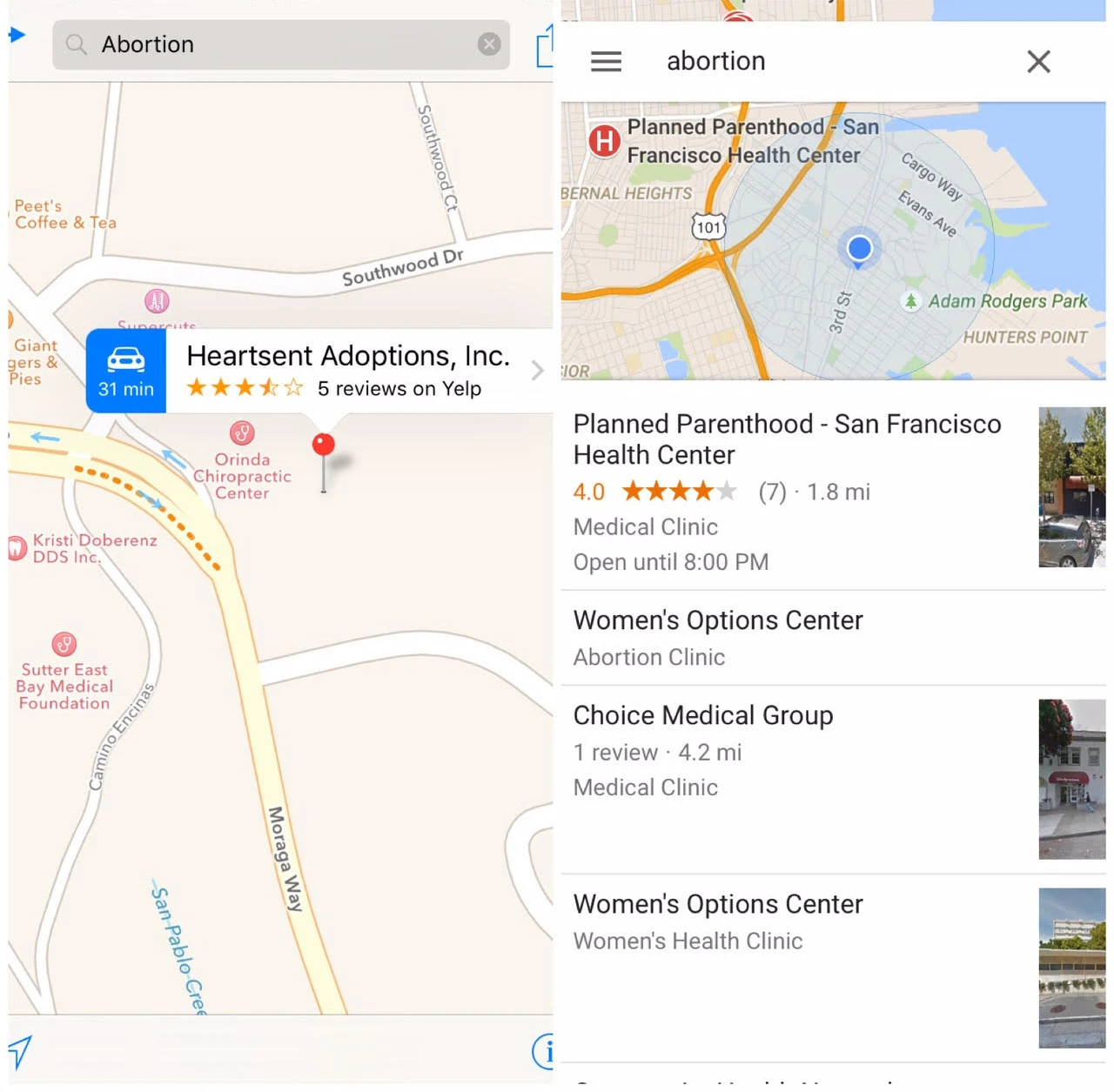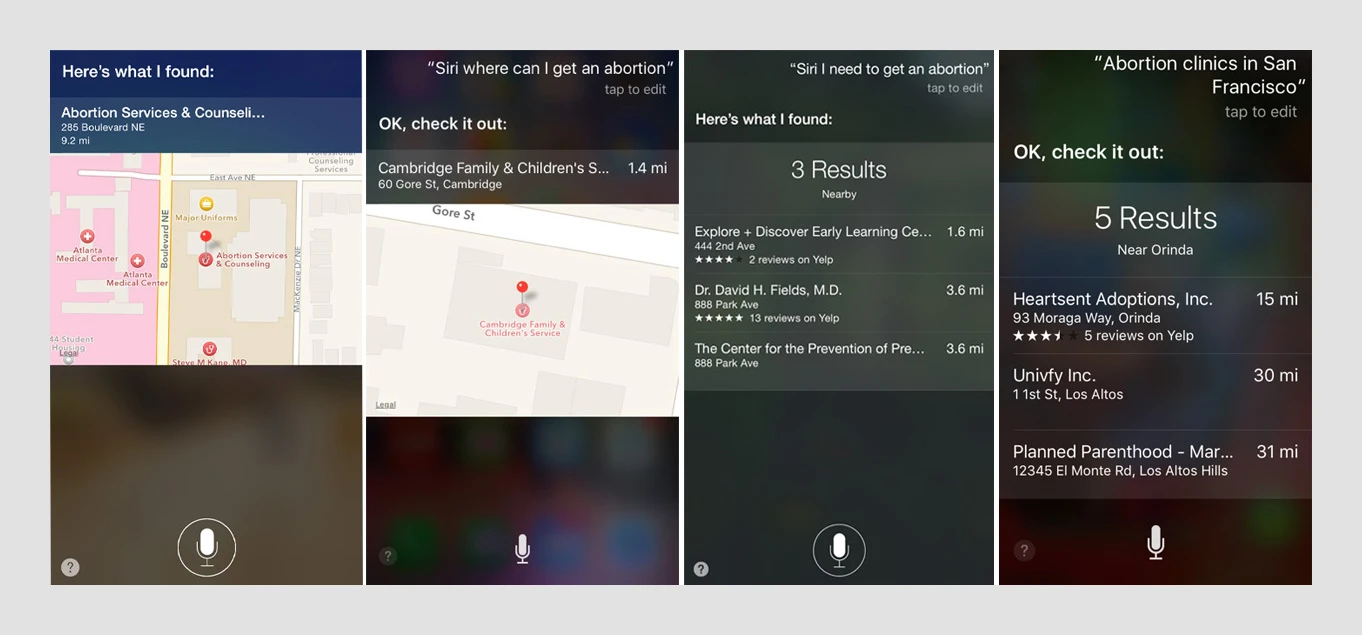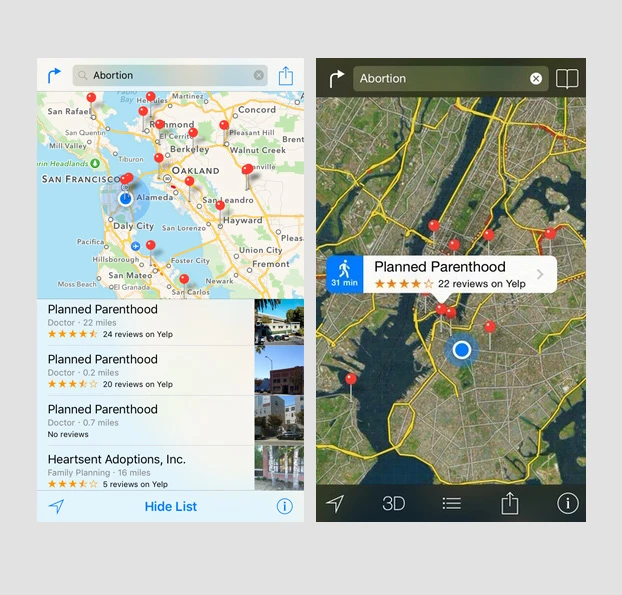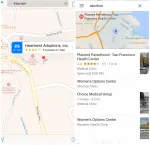Apple is fixing a flaw in its algorithm that had been directing people seeking information about abortions to fertility centers and adoption clinics.
During January, Fast Company tested both Siri and Apple Maps from various locations around San Francisco using the search term “abortion” in Maps and by asking Siri, “Where can I find an abortion provider?” We were directed to a domestic and international adoption agency almost 30 miles outside of the city called Heartsent Adoptions, and no abortion providers were included in the search results.
Apple has been aware of issues similar to these since 2011, when the media first noted that Siri, its voice recognition service, provided people searching for abortions with little or no information. In recent months, it seemed to reproductive health experts we spoke to that the problem had gotten worse. Siri and Apple Maps started to recognize the term “abortion,” but muddled it with results related to adoption.
“If Siri is silent on abortion, women will often look for information elsewhere,” says Planned Parenthood’s vice president of health Kim Custer. “But suggesting an adoption clinic might add to the existing stigma about abortions.”
In the past week, after performing identical searches to earlier ones, we received a more comprehensive list of Planned Parenthood facilities and other abortion providers. Adoption clinics continue to pop up, but near the bottom of the list.
Why the sudden change? One explanation is that these changes are a result of the company’s efforts to improve its Apple Maps search results with the launch of Apple Nearby. The company has been working to more accurately categorize small and large businesses for Apple Nearby, which was released with the most recent software update. With the new Nearby feature in iOS 9, Apple confirmed that “typed search queries deliver more relevant results from more categories.”
Apple Nearby surfaces lists of things like restaurants, coffee shops, and hundreds of other businesses that are located around a user. It also includes a category called “family services,” and within that, Planned Parenthood. Apple is making these improvements in real time, which might explain why we got such different results this week.
Fast Company initially received a tip about this issue from a nonprofit called Sea Change Program, which is working to reduce stigma around abortions. A researcher at UCSF, Alexis Hoffman, also tested Apple Maps and Siri across the country in recent months, including in San Francisco, Kansas, Chicago, New York, Philadelphia, and San Diego. They shared their screenshots with us (see slideshow) to demonstrate the differences in search results.
In many urban areas, Apple’s Siri directed people seeking information about abortion to adoption agencies. In Philadelphia, women were sent to “crisis pregnancy centers,” which typically don’t offer abortions and dissuade women from getting them. In Manhattan, someone searching for abortion was directed to a day care center for young children before a nearby Planned Parenthood.
By press time, the problem with Apple Maps’ search results seems to have been rectified in New York and San Francisco. But people searching “abortion” in Boston were getting directed to an adoption agency called Cambridge Family & Children’s Service. In Sherman, Texas, a crisis pregnancy center was included in the results. We have yet to test Apple Maps in other locations across the country.
“Critical Role To Play”
In recent months, since discovering the glitch, Sea Change Program had been working with researchers at UC San Francisco to put pressure on Apple to make the necessary changes to its search algorithm.

“Apple has a really critical role to play here in providing accurate and unbiased information to its users,” says Lauren Himiak, communications manager at Sea Change Program, in a recent interview.
On November 18, Hoffman and Christine Dehlendorf, an associate professor at the UCSF Department of Family and Community Medicine, along with Himiak, sent a letter to Apple CEO Tim Cook notifying him of the issue. In the letter, the authors called for Cook to rectify “Siri’s troubling lack of awareness of abortion providers.” More from the letter here:
Apple’s reputation for creating products that are easy to use and understand is well deserved. However, the transformation of Siri’s lack of knowledge of abortion providers to Siri’s anti-choice suggestions is alarming, and contributes to the stigma surrounding abortion care in our country. Despite the commonness of abortion, as nearly one-in-three women will have an abortion by the age of 45, women are confronted on a daily basis with society’s shame-based messaging that having an abortion is morally wrong and unacceptable. Women continue to be bullied, shamed, and marginalized for seeking an abortion, which can lead to isolation and silence. It is in these times of isolation, when women are more likely to turn to your product to locate the health care they need, that Siri’s misdirection to adoption agencies and nurseries is all the more undermining, implying women do not know what is best for themselves.
After receiving no response from Apple, the authors contacted Fast Company. We had not yet reached out to Apple about our investigation when the changes to the search results occurred.
The 2011 “Abortiongate”
In 2011, the Cupertino-based tech giant promised it would improve Siri, its voice recognition service, after bloggers noticed that it was reluctant to talk about reproductive health services. The scandal eventually became known as “Abortiongate” or “Sirigate.”
At the time, search experts rushed to Apple’s defense by stressing that the company was not involved in some pro-life conspiracy and rather blamed the glitch on the technical difficulties of search. “Siri’s not finding abortion clinics because Planned Parenthood and other places that perform abortions don’t call themselves that, not in their names, nor have they been associated with a category for that,” an article on Search Engine Land noted.

Search experts say they still don’t see this as intentional. “My hunch is that this isn’t political at all, even now,” says Sean Gourley, a data scientist and learning algorithms expert based in Silicon Valley. “Apple is not a search company, unlike Google, and its knowledge base is very different.” Apple Maps pulls data from third-party resources, like Yelp and Foursquare, not its own databases. Gourley, like Search Engline Land, noted that part of the problem might still be that Planned Parenthood doesn’t label itself as an abortion clinic (abortions make up 3% of all Planned Parenthood health services, according to the organization). That might explain why it was only categorized as a possible abortion provider through the efforts of the Apple Nearby team.

Regardless of the timeline, it is clear Apple wields a great deal of influence when it comes to reducing stigma around reproductive health.
“Apple is at the forefront of technology,” said UCSF’s Dehlendorf. “When they provide inaccurate search results, it’s stigmatizing and alienating for women who want to get the care they need.”
Recognize your brand’s excellence by applying to this year’s Brands That Matter Awards before the early-rate deadline, May 3.







